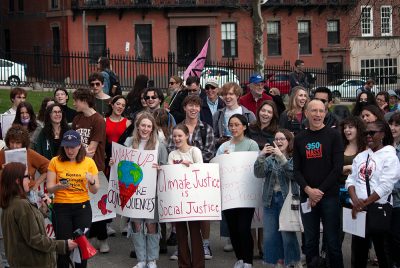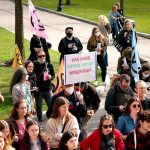
More than 100 activists gathered in front of the Massachusetts State House March 25 to advocate for climate justice and urged the City and policymakers to enact climate mitigation policies.
Specifically, the Crane Ledge Woods Coalition — a coalition to protect public green space from development — urged the City Council to protect and restore woodland areas on the Hyde Park border as part of its 2023 Fiscal Year budget. The coalition’s Change.org petition has over 3,500 signatures as of March 29.
The strike also pressured the Baker administration to overhaul the ISO New England — the regional energy grid operator — and build a “just and democratic energy grid,” according to a published toolkit.
The climate strike was one of many protests on the same day in support of “Fridays for Future” — a global environmentalism movement for climate justice that began in August 2018 — to protest the lack of efforts on climate crises.
Hailey Moll, communications lead for the Boston Climate Action Network, said the theme of this year’s strike is “to give political power and voice back to people.”
“It’s time that people and the life that we want to have, the way that we envision our planet and the quality of life that we deserve that we asked for, and we should have clean air and water and safe space,” Moll said. “It should be taken precedent over, not being overshadowed by corporate greed and by profitability and the bottom line of what matters.”
Judith Foster — the president and founder of H.E.R.O. Nurturing Center — said the awareness and mindfulness of the environment’s impacts on humans brought her to speak at the protest.
“We’re at a precipice, at a tipping point with this,” Foster said. “If we don’t do something right now, to not just clean our air, but our waters, our souls… our atmosphere in general, and clean up the relationships that we’ve misused over time.”
Foster added the importance for people to realize “environmental justice is social justice” since climate issues are inseparable.
“What’s good for the collective is good for everyone. Not just word sound, but actionable things,” Foster said. “Climate justice is the best place to start because it encompasses everyone.”
Foster said she was surprised to see the younger generation participate in the strike.
“The energy was awe-inspiring…I was pleasantly surprised it was mostly young people that were here today,” Foster said.
Keeley Bombard, president of the Environmental Student Organization at Boston University, said she thinks the strike helps ESO connect with more organizations in the greater Boston area.
“Sometimes I feel like our passion for environmental issues can kind of be siloed in our view bubble,” Bombard said. “But with this event, we’re able to work with other groups and, you know, contribute to something that’s a little bigger than just campus.”
Saahithi Achanta — the deputy director of the Environmental Affairs department for the BU Student Government and board member of BCAN — said it is “heartwarming” to see young people show solidarity with the strike.
“We’re going to be the generation that’s going to be responsible for creating progress, to make sure that climate change doesn’t have detrimental effects on future generations,” Achanta said. “The fact that we’re all there for each other, supporting each other and acting in solidarity to demand better things for the future is really important and significant.”
Bombard said the strike highlighted the importance of continuing fighting climate justice even though it might be incompatible with the financial bottom line.
“We want to be prioritizing people for the long term and being sustainable, which to me means being able to meet the needs of future generations that didn’t create this crisis, but are going to have to live with it,” Bombard said.




